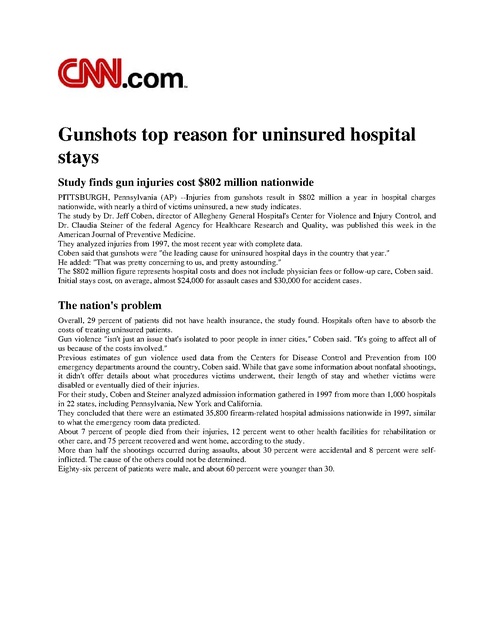Taser Article Gunshot Wound Costs
Download original document:

Document text

Document text
This text is machine-read, and may contain errors. Check the original document to verify accuracy.
~.com. Gunshots top reason for uninsured hospital stays Study finds gun injuries cost $802 million nationwide PITTSBURGH, Pennsylvania (AP) --Injuries from gunshots result in $802 million a year in hospital charges nationwide, with nearly a third of victims uninsured, a new study indicates. The study by Dr. Jeff Coben, director of Allegheny General Hospital's Center for Violence and Injury Control, and Dr. Claudia Steiner of the federal Agency for Healthcare Research and Quality, was published this week in the American Journal of Preventive Medicine. They analyzed injuries from 1997, the most recent year with complete data. Coben said that gunshots were "the leading cause for uninsured hospital days in the country that year." He added: "That was pretty concerning to us, and pretty astounding." The $802 million figure represents hospital costs and does not include physician fees or follow-up care, Coben said. Initial stays cost, on average, almost $24,000 for assault cases and $30,000 for accident cases. The nation's problem Overall, 29 percent of patients did not have health insurance, the study found. Hospitals often have to absorb the costs of treating uninsured patients. Gun violence "isn't just an issue that's isolated to poor people in inner cities," Coben said. "It's going to affect all of us because of the costs involved." Previous estimates of gun violence used data from the Centers for Disease Control and Prevention from 100 emergency departments around the country, Coben said. While that gave some information about nonfatal shootings, it didn't offer details about what procedures victims underwent, their length of stay and whether victims were disabled or eventually died of their injuries. For their study, Coben and Steiner analyzed admission information gathered in 1997 from more than 1,000 hospitals in 22 states, including Pennsylvania, New York and California. They concluded that there were an estimated 35,800 firearm-related hospital admissions nationwide in 1997, similar to what the emergency room data predicted. About 7 percent of people died from their injuries, 12 percent went to other health facilities for rehabilitation or other care, and 75 percent recovered and went home, according to the study. More than half the shootings occurred during assaults, about 30 percent were accidental and 8 percent were selfinflicted. The cause of the others could not be determined. Eighty-six percent of patients were male, and about 60 percent were younger than 30.

